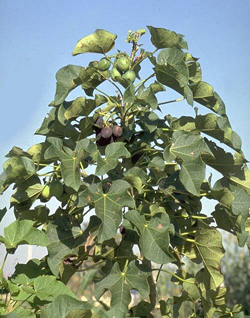"Someone Is Going to Have to Make Up The Supply That Is Always Being Demanded for Food and Feed"
15 Jun, 2007 03:45 pm
Ronald Steenblik is the Director of Research for the Global Subsidies Initiative of the International Institute for Sustainable Development based in Geneva. He answers scitizen's questions regarding the production, types, and overall state of biofuels.
 Biofuels are considered to be a cleaner fuel than oil. However, some say that they have too many negative aspects to be a serious replacement for oil.
Biofuels are considered to be a cleaner fuel than oil. However, some say that they have too many negative aspects to be a serious replacement for oil. What do we know about the production and consumption of biofuels on the environment?
First of all we should put it into perspective. The contribution that biofuels are making to total fuel consumption is just a few percentages at the moment. Already we're seeing different effects on the environment. One of the arguments in support of biofuels in the past has been that their tail-pipe emissions are cleaner than from the gasoline or biodiesel that they replace. That's probably true in developing countries where the fuel that is produced is usually not to the same standard as the fuel that comes out of refineries in Europe, North America and Japan. Often there is a lot of sulfur in fuels from developing countries, while there is very little sulfur, and therefore very little sulfur dioxide in ethanol and biodiesel. But compared with new cleaner petroleum fuels there is not so much of a difference. One recent study from Stanford University even showed that on balance, at least in some parts of the United States, were cars to run on E85, that is 85% ethanol and 15% gasoline, it might even be worse than using gasoline only.
The big environmental impact is associated with the farming of these crops, which requires quite a bit of land. In Europe most of the biofuel is biodiesel is made from rapeseed oil, which looks very nice in the spring, but also requires quite a lot of fertilizer and pesticides. In the United States, ethanol is mainly what is produced. It is made from corn, one of the crops that requires the most agri-chemical inputs of any crop produced in northern countries. By contrast the ethanol that is produced in Brazil is made from sugar, which is a much more productive crop, because it's a lot easier to produce ethanol from sugar than it is from starch. Also the refineries that produce ethanol are able to use the waste from squeezing sugar cane so they generate their own steam for process heat as well as electricity, which they are able to sell to electricity grids. The CO2 balance of ethanol that is produced in Brazil is much better than the CO2 balance of the fuel produced in the North.
Do all biofuels raise environmental concerns?
All do to some extent, but also what's not fully appreciated is that because the demand for biofuels is competing with demand for crops or cropland, producing them in one country can have a knock on effect on agriculture production in another. So what we are seeing at the moment is that the incentives for growing corn for ethanol in the United States are so great that farmers are rotating less between corn and soybeans, which is a nitrogen fixing crop, which means they have to use more fertilizer, more pesticides. And it means that less area is being planted for soybeans' 15% area more to corn, and 11% less to soybeans in the United States. Plus more and more of the soybean crop is going into biodiesel. Someone is going to have to make up the supply that is always being demanded for food and feed. The countries that are meeting that demand are in large part Argentina and Brazil. A lot of people are concerned about the potential impacts of biofuels on the Amazon. In fact, a lot of the soybean that is being produced is for food and feed. What we are seeing, thus, is a displacement of production of soybeans that might have otherwise taken place in the United States, to the Amazon.
The European Environmental Agency has created a list of precautions to adapt the production of plants used for energy purposes in tandem with the protection of the environment. What are its main proposals?
I haven't read the proposals, but I imagine that one of the requirements for the production of biofuel crops in Europe is the same type of protection for the environment that the EU already requires for farms receiving the single farm payment. Most of the standards that are being drawn up now regarding biofuels will state that biofuels should not come from crops that are farmed on land that was recently deforested. That is OK in terms of the actual feedstock for biodiesel. However, in terms of overall effect on agriculture, if you are expecting more biomass production for land, and at the same time expecting to meet the same level for food and feed demand, production will have to occur somewhere, whether it's for biofuels or food and feed. Again, all of the standards applying very narrowly to biofuels still don't solve the problem of how the rest of the crops in the world are produced.
Who constitutes the anti-biofuel movement?
There isn't really a coherent movement, but there are a number of people coming from groups that have different perspectives. Among the first groups to raise alarm bells have been organizations like Lester Brown's Earth Policy Institute. It has long been concerned about whether or not there will be enough food produced in the world to feed a growing population. Also, you have food companies like Unilever who are big purchasers of commodities that are concerned about the rising prices of their primary feedstocks for foods and cosmetics. There are also organizations that are concerned about the burden on taxpayers or on consumers due to the effects of mandated biofuels. There are proposals being made by politicians in the United States calling for as much as 60 billion gallons a year of ethanol to be used in the next 2O years, which is 10 times the current level. Some have even called for 100 billion gallons a year. If current policies remain in place we're looking at 50 to 60 billion dollars a year in subsidies to keep that production going. There are environmental groups that are very concerned about the possible impacts of expanded production of feedstocks for biofuels. They are particularly concerned about whether the land for biodiesel will encourage a lot more felling of tropical rainforest land for the production of palm oil.
Interview by: Christopher Le Coq
Ronald Steenblik is the Director of Research for the Global Subsidies Initiative of the International Institute for Sustainable Development based in Geneva.
-
12/12/12
Peak Oil is Nonsense Because Theres Enough Gas to Last 250 Years.
-
05/09/12
Threat of Population Surge to "10 Billion" Espoused in London Theatre.
-
05/09/12
Current Commentary: Energy from Nuclear Fusion Realities, Prospects and Fantasies?
-
04/05/12
The Oil Industry's Deceitful Promise of American Energy Independence
-
10:00
Shaky Foundations for Offshore Wind Farms







 Read more
Read more